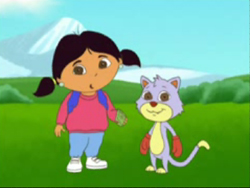March 27, 2007
Macaronic Maraka
 The funniest moments on "Saturday Night Live" these days are very often the satirical cartoons featured on Robert Smigel's "TV Funhouse," and last Saturday's episode was no exception. This time it was "Maraka," a withering parody of that favorite of the preschool set, "Dora the Explorer." If you missed it you can watch "Maraka" on YouTube, at least until NBC's next copyright crackdown. [Update: NBC also hosts the clip on the SNL site here.]
The funniest moments on "Saturday Night Live" these days are very often the satirical cartoons featured on Robert Smigel's "TV Funhouse," and last Saturday's episode was no exception. This time it was "Maraka," a withering parody of that favorite of the preschool set, "Dora the Explorer." If you missed it you can watch "Maraka" on YouTube, at least until NBC's next copyright crackdown. [Update: NBC also hosts the clip on the SNL site here.]
"Maraka" exquisitely spoofs the peculiar discursive structure of "Dora" (and its spinoff, "Go, Diego, Go!"), in which the viewing child is expected to assume the role of interlocutor, taking part in a "conversation" with the cartoon characters in order to solve a particular task. (The show's creators discuss the rationale for this interactive style here.) The pauses in the dialogue that allow the child at home to respond to Dora and friends can be a bit unnerving for adult onlookers, and "Maraka" nails the pseudo-conversational format perfectly, with the title character posing increasingly bizarre and inappropriate questions.
The other linguistic aspect parodied by "Maraka" is the zealous bilingualism of "Dora" and "Diego," wherein the Latino protagonists teach children Spanish words and phrases by juxtaposing English and Spanish translation equivalents (e.g., "Look! ¡Mira!"). Maraka introduces herself in the typical didactic style:
¡Hola! Hello! I'm Maraka! ¡Soy Maraka!
But pretty soon this code-switching starts to take on absurd proportions as Maraka injects other languages besides Spanish. When she spots a hot-air balloon that will take her and her cat Mittens to Penguin Island, she exclaims in English, Spanish, German, and Russian:
It's a balloon! ¡Es un globo! Luftballon! Vozdúšnyj!
Later on there are two long macaronic utterances from Maraka that I'd love to see transcribed. (The closed captioning unhelpfully subtitles these sections as "gibberish.") The Wikipedia page on "Dora" already mentions the "Maraka" spoof and says that the languages in the cartoon include "Chinese, German, and Swahili." There are even some clicks thrown in, just to drive home the multilingual mockery. Some might object to the ridicule leveled at well-meaning attempts to teach children foreign languages, but "Maraka" never descends into xenophobia, instead directing its satire at the heavy-handedness of children's educational programming. I for one will never look at "Dora" quite the same way again.
[Update: A couple of emailers (Michèle Sharik and Ray Girvan) wondered about Maraka's pronunciation of "Mittens" with a glottal stop: [ˈmɪʔənz]. I didn't take that as dialectally significant, but merely something the voice actor threw in to make Maraka sound more child-like. Ben Sadock has his own theory:
While glottalized /t/s in place of flaps are indeed a dialectologically interesting feature (endemic, I think, to the Northeast), I think that a subtext of this video is a discomfort with flapping in English. Contrast the glottal stop in 'mittens' to the downright aspirated /t/ in 'mountain.' I think the way this operates is that the latter is meant to parody the self-consciously 'correct' pronunciation you find on children's TV, while the former is meant to sound childish, like the exaggeratedly 'childish' pronunciation also often used on children's TV. Either way, it betrays a real anxiety with flapping.
Meanwhile, the pseudo-interactive style of "Dora"/"Maraka" reminds Annette Teffeteller of the creepy "What do you think, Linda?" scene in Fahrenheit 451.]
[Update, 4/11/07: The SNL Transcripts site has the "Maraka" sketch now, but they're no help with the two macaronic passages (one is labeled "a mixture of Spanish, Swahili, and a host of other languages" and the other simply "Spanish"). Meanwhile on Wikipedia, the page for "Dora the Explorer" now expands Maraka's linguistic repertoire to "Chinese, German, Portuguese, Hebrew, Swahili, Xhosa, Korean and Russian."]
Posted by Benjamin Zimmer at March 27, 2007 12:10 AM